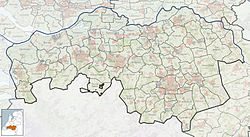Toponymy
In ancient times it was simply called Loon. Loon or Lo(o) means forest with low trees, with an open meadow and swamp. The element "over" was added to the name much later, to distinguish it from the nearby Loon Ravenstein, Neerloon. "Neder" and "over" here means, respectively, lower and higher, or downstream and upstream.
History
Since the formation of the Kingdom of the Netherlands, the village was part of the Maashees en Overloon municipality with the nearby hamlet of Maashees. In 1942 this municipality was added to the municipality of Vierlingsbeek and in 1998 they were all included within Boxmeer. Around 1900 the village was widely spread across moorlands and poorly connected to larger towns such as Venray, Vierlingsbeek, Sambeek, Oploo en Sint Anthonis. There were about 600 people in 110 houses.
The oldest written mention of Loon is a grant of charter from Jan van Cuijk from the year 1308. Jan van Cuijk in this deed, that he recorded at St. Lawrence Church in Vierlingsbeek, gives the right to waive the (low) tax in(Over)Loon.
Administrative and legal until 1795
The Loon village government consisted of three aldermen, four jurors and one or two bankers. The latter were especially responsible for the finances. From the fourteenth century, the aldermen had jurisdiction together with that of an alderman of the Vierlingsbeek bank. Vierlingsbeek was the head of the four aldermen. Criminal cases had to go to the bench in Grave. This joint arrangement of aldermen was maintained until 1803. From that year, Overloon had the power to regulate the judiciary itself. This lasted only seven years, due to the unstable political situation.
Between 1794 (after the French invasion) and 1810 the territory of the Netherlands, and hence that of Overloon, was first made part of the Republic of France (1794-1795), and then successively of the Kingdom of The Netherlands (1795 - 1796), the Batavian Republic (1796-1805), the Batavian Commonwealth (1805-1806) and the Kingdom of Holland (1806-1810).
Administration after 1810
In 1810 the entire Dutch territory was annexed by France and became a part of the Empire of France (1810-1814). As a result, there was new legislation and a different organization of public administration and law in the Netherlands. At local level, municipalities were formed, under the direction of a mayor. The village authorities were abolished from that moment. Overloon and Maashees merged into one municipality, of which Holthees was also a part. This had the name, Maashees and Overloon. This was, in 1942, in the municipality Vierlingsbeek, which in turn, on 1 January 1998, merged with Boxmeer.
World War II
In 1944, Overloon was almost completely destroyed at the Battle of Overloon, officially also known as Operation Aintree, in a ten-day tank battle between a British tank division and the German army. The Germans were trying to keep the Allies from crossing the Maas. There were more than two thousand dead. Overloon was liberated on 14 October 1944, but the fighting lasted for some days longer. This is the reason for the establishment of the War Museum, which later became known as the National War and Resistance Museum and then Liberty Park. [3]
This page is based on this
Wikipedia article Text is available under the
CC BY-SA 4.0 license; additional terms may apply.
Images, videos and audio are available under their respective licenses.








